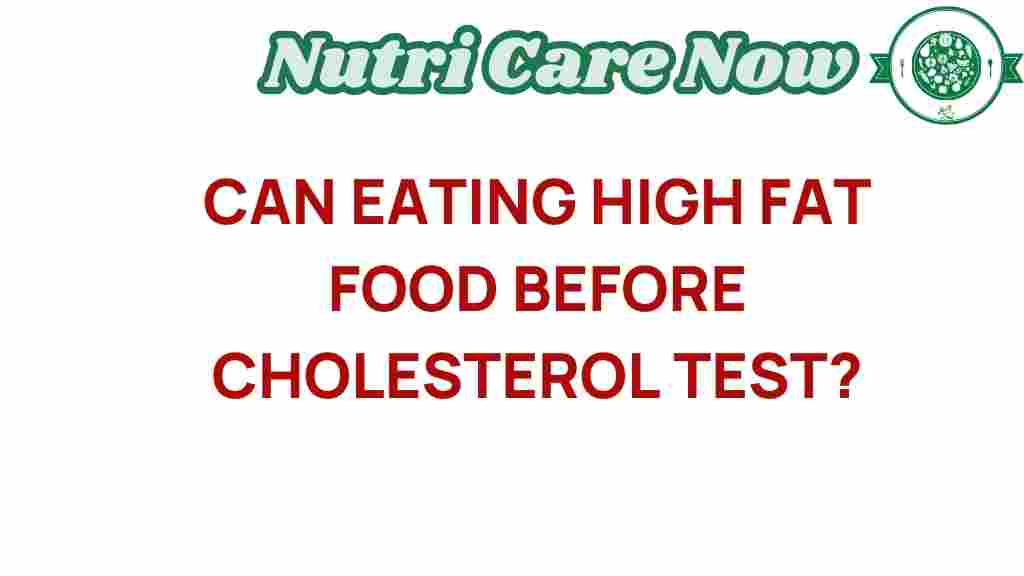Can Eating High-Fat Foods Before a Cholesterol Test Impact Results?
When preparing for a cholesterol test, many factors come into play, including what you eat beforehand. A common question that arises is whether consuming high-fat foods can impact the results of a cholesterol test. Understanding how dietary choices can influence your cholesterol levels is essential for anyone looking to maintain a healthy lifestyle. In this article, we will explore the relationship between high-fat foods and cholesterol tests, addressing health myths, providing nutrition advice, and discussing the implications for LDL levels and triglycerides.
Understanding Cholesterol and Blood Tests
Cholesterol is a waxy substance found in your blood, essential for building cells and producing hormones. However, high levels of certain types of cholesterol can increase the risk of heart disease. Cholesterol tests, also known as lipid panels, measure the amount of cholesterol and triglycerides in your blood. The primary components evaluated in a cholesterol test include:
- LDL (Low-Density Lipoprotein): Often referred to as “bad” cholesterol, high levels of LDL can lead to a buildup of plaque in your arteries.
- HDL (High-Density Lipoprotein): Known as “good” cholesterol, HDL helps remove other forms of cholesterol from your bloodstream.
- Triglycerides: These are a type of fat found in the blood, and high levels can also increase heart disease risk.
Health guidelines suggest that maintaining a balance of these lipids is vital for overall health. But how do high-fat foods fit into this picture?
The Impact of High-Fat Foods on Cholesterol Tests
High-fat foods can significantly impact your cholesterol levels, particularly if consumed shortly before a cholesterol test. The following points illustrate how these foods can affect test results:
- Temporary Elevation of LDL Levels: Consuming high-fat meals can lead to a temporary increase in LDL cholesterol. This spike can misrepresent your typical cholesterol levels.
- Triglyceride Levels: High-fat foods, especially those high in saturated fats, can raise triglyceride levels significantly. Elevated triglycerides can skew the results of your cholesterol test.
- Fasting Requirements: Most physicians recommend fasting for 9-12 hours before a cholesterol test to ensure accurate results. Eating high-fat foods during this time can lead to misleading outcomes.
Health Guidelines and Nutritional Advice
To ensure accurate cholesterol test results, it’s essential to follow health guidelines regarding diet. Here are some nutrition tips to consider:
- Follow Fasting Guidelines: If your doctor recommends fasting, adhere to it strictly. Avoid consuming high-fat foods and any calorie-containing beverages.
- Choose Healthy Fats: Instead of saturated fats found in red meat and full-fat dairy, opt for healthier fats like those in avocados, nuts, and olive oil.
- Monitor Portion Sizes: Even healthy fats can contribute to elevated cholesterol levels if consumed in large amounts.
- Increase Fiber Intake: Foods high in soluble fiber can help lower LDL levels. Incorporate oats, beans, and fruits into your diet.
Step-by-Step Process for Preparing for a Cholesterol Test
To ensure the best outcomes for your cholesterol test, here’s a helpful step-by-step guide:
- Consult Your Doctor: Discuss any medications or dietary restrictions with your healthcare provider.
- Follow Fasting Instructions: If recommended, fast for at least 9-12 hours before the test.
- Avoid High-Fat Foods: Steer clear of high-fat meals in the hours leading up to your appointment.
- Stay Hydrated: Drink plenty of water, as it helps with blood flow and can enhance the accuracy of the test.
- Schedule Your Test: Choose a convenient time for your cholesterol test to avoid any stress or haste.
Troubleshooting Tips: Common Myths About Cholesterol Tests
Many myths surround cholesterol tests and dietary impacts. Let’s debunk some of these health myths:
- Myth 1: “Eating high-fat foods a few days before the test won’t affect my results.”
Fact: Consuming high-fat foods can lead to short-term elevations in LDL and triglycerides. - Myth 2: “I can eat whatever I want as long as I fast before the test.”
Fact: The quality of your diet leading up to the test matters. Poor dietary choices can have lingering effects. - Myth 3: “Only saturated fats raise cholesterol levels.”
Fact: Trans fats and high amounts of refined carbohydrates can also negatively impact cholesterol levels.
Conclusion: Making Informed Choices
In conclusion, the consumption of high-fat foods before a cholesterol test can indeed impact the results, leading to misleading assessments of your lipid levels. By adhering to health guidelines and following proper nutrition advice, you can ensure more accurate cholesterol test results. Remember to consult with your healthcare provider for personalized dietary recommendations and to understand the implications of your cholesterol levels on your overall health.
For more information on cholesterol and maintaining a healthy diet, check out this nutrition guide. Additionally, you can explore more health-related topics on our website here.
Taking charge of your dietary choices, especially leading up to a cholesterol test, is a crucial step in maintaining your cardiovascular health and debunking common health myths surrounding cholesterol and diet.
This article is in the category Health and created by NutriCareNow Team
